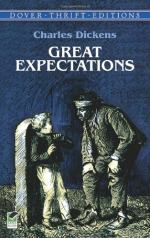Now, when I saw Joe open his blue eyes and roll them all round the kitchen in helpless amazement, I was overtaken by penitence; but only as regarded him — not in the least as regarded the other two. Towards Joe, and Joe only, I considered myself a young monster, while they sat debating what results would come to me from Miss Havisham’s acquaintance and favour. They had no doubt that Miss Havisham would “do something” for me; their doubts related to the form that something would take. My sister stood out for “property.” Mr. Pumblechook was in favour of a handsome premium for binding me apprentice to some genteel trade — say, the corn and seed trade, for instance. Joe fell into the deepest disgrace with both, for offering the bright suggestion that I might only be presented with one of the dogs who had fought for the veal-cutlets. “If a fool’s head can’t express better opinions than that,” said my sister, “and you have got any work to do, you had better go and do it.” So he went.
After Mr. Pumblechook had driven off, and when my sister was washing up, I stole into the forge to Joe, and remained by him until he had done for the night. Then I said, “Before the fire goes out, Joe, I should like to tell you something.”
“Should you, Pip?” said Joe, drawing his shoeing-stool near the forge. “Then tell us. What is it, Pip?”
“Joe,” said I, taking hold of his rolled-up shirt sleeve, and twisting it between my finger and thumb, “you remember all that about Miss Havisham’s?”
“Remember?” said Joe. “I believe you! Wonderful!”
“It’s a terrible thing, Joe; it ain’t true.”
“What are you telling of, Pip?” cried Joe, falling back in the greatest amazement. “You don’t mean to say it’s—”
“Yes I do; it’s lies, Joe.”
“But not all of it? Why sure you don’t mean to say, Pip, that there was no black welwet coach?” For, I stood shaking my head. “But at least there was dogs, Pip? Come, Pip,” said Joe, persuasively, “if there warn’t no weal-cutlets, at least there was dogs?”
“No, Joe.”
“A dog?” said Joe. “A puppy? Come?”
“No, Joe, there was nothing at all of the kind.”
As I fixed my eyes hopelessly on Joe, Joe contemplated me in dismay. “Pip, old chap! This won’t do, old fellow! I say! Where do you expect to go to?”
“It’s terrible, Joe; an’t it?”
“Terrible?” cried Joe. “Awful! What possessed you?”
“I don’t know what possessed me, Joe,” I replied, letting his shirt sleeve go, and sitting down in the ashes at his feet, hanging my head; “but I wish you hadn’t taught me to call Knaves at cards, Jacks; and I wish my boots weren’t so thick nor my hands so coarse.”
And then I told Joe that I felt very miserable, and that I hadn’t been able to explain myself to Mrs. Joe and Pumblechook who were so rude to me, and that there had been a beautiful young lady at Miss Havisham’s who was dreadfully proud, and that she had said I was common, and that I knew I was common, and that I wished I was not common, and that the lies had come of it somehow, though I didn’t know how.




